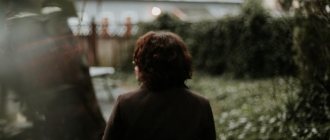Conflict - what kind of phenomenon?
It should be noted that in order to fulfill a social role, a person needs certain skills and time to learn how to do this. Sometimes it turns out that the same subject must perform conflicting duties. A striking example is the wife-director. At home she should be subordinate to her husband, and at work she should indicate to her subordinates. Because of this, contradictions appear within the individual (internal conflicts) and tense relationships with others. It is precisely because of his status and position in society that certain requirements are imposed on a person. Social role is the behavior of people depending on different requirements for them. One and the same person can simultaneously be a brother, father, son-in-law, worker, friend.
We often hear the words “conflict”, “conflict person”, “intrapersonal conflict”, what kind of concepts are these? These are certain contradictions that already exist or may exist between different social actors. They arise on the basis of a discrepancy between interests, motives of behavior, values, needs, and so on.
Conflict is a normal phenomenon in society. No two people are the same, so sometimes there is a clash of opinions and interests regarding a situation.
Experts identify many types of conflict, one of which is role conflict. Confrontation can be not only between two people, enterprises or countries. Very often a person struggles with contradictions within himself.
Causes and meaning
The causes of these conflicts are:
- contradictions initially embedded in the role,
- contradictions that arise between the role and its perception in society,
- contradictions that arise due to the presence of several roles at once, and they cannot coexist together.
As a rule, the established foundations in society, the rules, put pressure on a person . If a role requires complex actions and a person cannot cope with them, not only internal conflict and feelings arise, but also external conflict, when condemnation by society appears.
The actions of an individual are assessed by others and sometimes highly condemned, which only intensifies role conflict.
Role conflicts arise due to contradictions between the role positions of an individual, his capabilities and corresponding role behavior.
However, role conflicts are sometimes necessary for an individual to understand himself and understand whether the chosen role is appropriate or needs to be changed.
About the social roles of a person in this video:
How to avoid conflict in the classroom? Read about it here.
Role conflict as a type of confrontation
This type of collision is characterized by the fact that it occurs only during certain duties performed. The concept implies a discrepancy between some elements of one or more roles. To make it clear, you can imagine a situation from life. A psychologist working in a school is perceived by children as a teacher. Because of this, a distance arises between him and the students. On the other hand, he must be on an almost equal relationship with the children in order to win them over and help them solve personal problems.
In the family, at school or at work, role conflict often manifests itself. Everyone can give examples of confrontations and clashes from their own lives. Some were able to cope with them, others cannot, but really want to. In order to solve any psychological problem, it is necessary to understand its causes.
Scope of the role and how to obtain it
The scope of the role will depend on the range of interpersonal relationships. So, the larger it is, the larger the scale of the role will be. For example, the social roles of husband and wife are of a very large scale, since a wide range of relationships has been established between the spouses (they are interested in the most different aspects of each other’s lives). Other relationships (for example, between a seller and a buyer) are limited by specific actions (in this case, related to the purchase).
How a role is acquired may depend on the extent to which it is inevitable for the individual. For example, the roles of a young person (man, woman, old man) can be automatically determined by age and gender. Achievement of other roles occurs through a process of purposeful social effort (for example, student, professor, etc.).
What types of such conflict are there?
Before focusing on what causes role conflict, you need to decide on its types. After all, the nature of its occurrence depends on which contradiction dominates.
There are few role conflicts, they are divided into collisions
- between roles;
- within one role.
The first type implies inconsistency, a complete contradiction between several roles. For example, a woman works irregular hours, and has small children and a disgruntled husband waiting for her at home. She needs to show good results at work and fulfill her duties at home - doing laundry, cooking, communicating with her children and husband. In the end, she physically cannot cope with all this set of demands, and besides, her husband expresses dissatisfaction. This results in a conflict between the roles.
The second type of role conflict is also common. For example, when a woman is a mother. Her husband makes the following demands on her, as a mother: she must wake up the children, wash them, feed them and dress them. Children, in turn, expect fun games, educational tasks and time spent on her lap from their mother. There are contradictions between the two expectations, since the woman does not physically have time to please the two sides of social interaction.
These types of role conflicts differ significantly from each other. Inter-role conflicts occur when the behavior of a person performing different roles does not meet the expectations of others. These expectations and requirements in most cases do not depend on the subject himself. They are formed by public opinion, traditions, and stereotypes. Intra-role confrontations depend on a person’s perception of his behavior in terms of the expectations that his environment has for him. There is a process of layering the ideas of people and their groups onto the role performed by one subject.
Types of role conflicts are complemented by one more: personal-role conflict. It involves a discrepancy between the role and the needs and values of the individual. This type of collision is also considered intrapersonal. Such examples of role conflicts from life are common. Thus, an honest young accountant, trying to do his job correctly, will constantly struggle within himself if his superiors expect him to engage in financial fraud for their own benefit.
Basic characteristics of social roles
Scale
They can be limited and, accordingly, blurred, or, as they also call it, wide in range. Limited is when there is a specific goal between the participants in the interaction. To satisfy it, they need certain services from each other.
To make it clearer, I will give examples: you came to the store to buy bread, being in the role of a client. You turn to the seller not with a request to listen to what a hard day it was, and how tired you are of the boss, but to tell you which bread is the freshest and how much it costs. Because formally, your interaction should be within the scope of the services offered by the store.
But between husband and wife there is a wide range, so to speak, of services. They have the right to claim knowledge about each other's various areas, they have certain responsibilities and rights towards each other.
By method of receipt
They are divided into types such as prescribed and conquered. That is, when we are born, we receive the role of a child, son or daughter, automatically, by default. In the same way, growing up, we become a man, then a woman, then a grandmother or grandfather.
But you have to work hard and make an effort on the conquered ones, because they characterize a profession or field of activity, achievements. For example, to become a surgeon, you first need to graduate from medical university and undergo an internship. Then train for some time and only then get the right to operate.
According to the degree of formalization
If you have violated traffic rules, the traffic police officer will not communicate with you at all like parents or close friends. The difficulty is that sometimes people lose their professional position and take any criticism personally.
Let’s say that in a store, a customer swore at the seller regarding the quality of the product, and he injured himself, believing that the insults applied directly to him. Sometimes it happens that formal relationships develop into informal ones, that is, into closer ones.
This happens when people often come into contact in activities, and begin to experience any feelings about each other’s life stories and communication in general. Their behavior changes, the boundaries of the topics discussed expand, and so on.
By type of motivation
Each person satisfies a certain need, performing some duty or function. Let’s say a parent cares about the life and health of the baby out of feelings of love and the desire to ensure the safety of his child to continue his family line, in order to feel that he is a good father.
But as a boss, he pursues completely different goals - the desire to win competition with other companies and win over consumers. Complete the tasks assigned to him or, in general, simply work for a good cause.
Why does role conflict occur?
The clashes between people, their expectations and ideas, largely depend on the formed norms and rules of society. If a person does not conform to established stereotypes and rules, as well as legal norms for regulating behavior, he experiences a role conflict. You need to understand that it does not appear out of nowhere. First, a person’s action occurs (within the framework of his activity), then his behavior is analyzed from the outside based on the listed mechanisms, then an assessment is given.
Status personality set
Status set of personality
This is a set of status positions.
One and the same person can simultaneously be a son, a husband, a Russian citizen and a military serviceman. Within the framework of a personality’s status set, the following components are distinguished:
- prescribed status - the status we receive from the moment we are born. It includes everything related to innate characteristics (gender, nationality);
- achieved status - a status acquired by a person as a result of efforts or a successful combination of circumstances (spouse, surgeon);
- mixed status - a status that has signs of being prescribed and achieved, that is, one that a person did not receive at the time of birth and not at his own request (unemployed, disabled due to a car accident);
- main status. In modern society, it is most often determined by the professional field in which a person is involved, or his main occupation (Nobel Prize winner).
Mechanisms of psychological defense during clashes of expectations
Role conflict brings discomfort to a person, because any interference in his inner world is regarded as an encroachment on the security and recognition of the individual. Therefore, during such clashes, protective mechanisms of the psyche are triggered, helping the subject maintain internal harmony.
- Separation of roles. A person deliberately temporarily stops performing one of the roles, thereby giving himself the opportunity to rest and “reboot”. But, at the same time, he continues to respond to the requirements that relate to the performance of this role.
- Rationalization. It occurs when the subject wishes, but due to certain circumstances, cannot behave according to the expectations of others. Defending against a significant role, the human psyche looks for its negative aspects in order to prevent role conflict. Examples of such defense are often found among schoolchildren, people who cannot achieve their goals.
Concept, types and characteristics of the role
In psychology, interaction between people is determined by role relationships. On the other hand, roles are individual personal characteristics of subjects. Most of what a person thinks and does relates to his social roles.
Society controls the interaction of people in accordance with the repertoire of their roles, which are performed by communicating people. For each individual, a wide variety of roles are provided throughout life: child, schoolchild, student, father or mother, engineer, doctor, representative of any segment of society, etc.
Are you an expert in this subject area? We invite you to become the author of the Directory Working Conditions
Role training is needed in order to:
- Performing duties and exercising rights depending on the role accepted and performed;
- Acquiring attitudes and behavioral skills that correspond to the accepted role and have an adequate emotional state.
A role, from the point of view of sociology and psychology, is a set of social norms that society (group) encourages a person to master. Most often, a role is defined as a dynamic aspect of status, a list of real functions that a group assigns to its member, a system of expected behavioral stereotypes for performing a specific job.
Types of roles determine the characteristics of the groups in which the individual is included. In accordance with social relations, social and interpersonal roles are distinguished. The first of them relate to social status, profession or type of activity (for example, teacher, student, seller, client, etc.). Socio-demographic roles (for example, husband, wife, daughter, son) are also considered separately. Man and woman are also certain roles that are biologically predetermined and involve specific aspects of behavior.
Finished works on a similar topic
Course work Roles and role expectations 410 ₽ Essay Roles and role expectations 220 ₽ Test work Roles and role expectations 210 ₽
Receive completed work or specialist advice on your educational project Find out the cost
Note 1
Interpersonal roles in psychology refer to interpersonal relationships regulated at the emotional level (for example, leader, family idol, etc.).
In accordance with the norms and expectations that are assigned to a particular role, they are divided into:
- represented roles (system of expectations of a person and a certain group);
- subjective roles (expectations a person associates with his status, i.e. his subjective idea of how he will act in relation to persons with a different status);
- roles played (the observable behavior of a person who has a given status in relation to other people with a different status).
The difference between tension and conflict within a role
We all go through a certain process of socialization. From a young age, children repeat the actions of adults, thereby adopting experience and role-playing behavior. Everyone goes through the process of socialization differently, some have had good experience since childhood, others have not seen anything positive. When a person grows up, he begins to behave according to his position and role. And here role tension can arise - the subject is simply not ready for the demands that the public places on him. To eliminate such tension, students undergo practical training, teenagers learn household management skills, and so on.
Tension increases and leads to conflicts when opposing roles are layered on top of each other. For example, a girl is passing exams, being a successful student, and trying to care for a child, having recently taken on the role of mother.
Types and characteristics of role conflicts
The classification of role conflicts in the scientific literature is quite extensive, but most experts name the following main types:
- interpersonal conflict that arises between different roles of different people;
- intrapersonal conflict between the role being played and the role expectations of others;
- interrole conflict, when one individual plays incompatible roles;
- intra-role conflict that arises between a role and a person’s internal needs.
Note 2
These types of conflicts are listed in order of increasing depth of personal issues. The first two types most often relate to social roles, the other two are associated with personal roles.
Analyzing situations and types of role conflicts, we can conclude that they all obey the same pattern - these are contradictions between internal and external factors of personality functioning.
A feature of role conflict is the absence of clearly defined stages of its development and influence on interpersonal conflicts.
Any conflict has a pre-conflict situation, the beginning of the conflict itself, its escalation, resolution and a post-conflict period. It must be said that role conflict can develop into a crisis. Its functions are divided into positive and negative.
Positive functions are, first of all, stimulating personal development, eliminating existing shortcomings, for example, in an enterprise, leading to conflicts. Negative functions include the possibility of deviations in an individual’s behavior and the emergence of interpersonal conflict.
A person and the role that he has to play are interconnected by the psychological characteristics necessary to fulfill social roles. If this dependence is ignored, tension and role conflict arise. Role tension occurs when, under the pressure of external circumstances, a person performs a role that does not correspond to his interests, inclinations, beliefs, and internal attitudes. In this case, internal stress and withdrawal from the role occurs. Your own role is a high-quality realization of yourself according to your strengths.
Of course, internal contradictions negatively affect interpersonal relationships with colleagues. Internal conflict leads to aggression, the desire to humiliate others, and leads to clashes with others. This situation is typical for inter-role and intra-role conflicts.
Ways to resolve role conflicts
They are divided into two types:
- external;
- internal.
The first type is that a person has the opportunity to protect himself from role conflicts. He may quit his job, stop communicating with his old friends, change his vacation spot, and so on.
The second type, on an unconscious level, protects us from unnecessary stress associated with role tension and conflict. Here the classic defense mechanisms come first: repression, isolation, rationalization, identification and some others. He begins to actively act when there is no way to solve the situation differently; the person either does not know how to do it or cannot. In this case, it is not the situation of conflict or tension that changes, but the person’s attitude towards it, his perception of the environment.
Classification
Psychologists identify the following types of role conflicts:
- Intra-role . Appears when a social role involves complex relationships and conflicting expectations in society.
- Interrole . It occurs if an individual has several social roles at once and they have incompatible requirements.
- Personal-role . It happens when the role does not correspond to the values and needs of the individual.
Experts also highlight situational role conflict . It happens when an individual finds himself in a new role for himself, but cannot fulfill it, because he remembers the old role.
A person gets used to new responsibilities and is not ready to immediately express himself fully .









